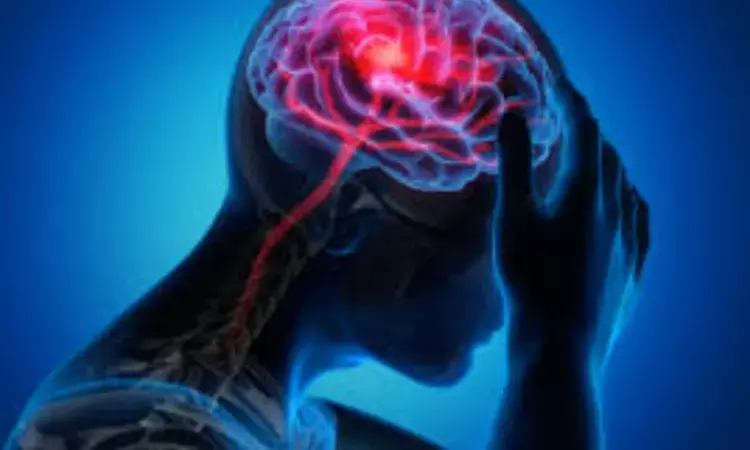- Home
- Medical news & Guidelines
- Anesthesiology
- Cardiology and CTVS
- Critical Care
- Dentistry
- Dermatology
- Diabetes and Endocrinology
- ENT
- Gastroenterology
- Medicine
- Nephrology
- Neurology
- Obstretics-Gynaecology
- Oncology
- Ophthalmology
- Orthopaedics
- Pediatrics-Neonatology
- Psychiatry
- Pulmonology
- Radiology
- Surgery
- Urology
- Laboratory Medicine
- Diet
- Nursing
- Paramedical
- Physiotherapy
- Health news
- Fact Check
- Bone Health Fact Check
- Brain Health Fact Check
- Cancer Related Fact Check
- Child Care Fact Check
- Dental and oral health fact check
- Diabetes and metabolic health fact check
- Diet and Nutrition Fact Check
- Eye and ENT Care Fact Check
- Fitness fact check
- Gut health fact check
- Heart health fact check
- Kidney health fact check
- Medical education fact check
- Men's health fact check
- Respiratory fact check
- Skin and hair care fact check
- Vaccine and Immunization fact check
- Women's health fact check
- AYUSH
- State News
- Andaman and Nicobar Islands
- Andhra Pradesh
- Arunachal Pradesh
- Assam
- Bihar
- Chandigarh
- Chattisgarh
- Dadra and Nagar Haveli
- Daman and Diu
- Delhi
- Goa
- Gujarat
- Haryana
- Himachal Pradesh
- Jammu & Kashmir
- Jharkhand
- Karnataka
- Kerala
- Ladakh
- Lakshadweep
- Madhya Pradesh
- Maharashtra
- Manipur
- Meghalaya
- Mizoram
- Nagaland
- Odisha
- Puducherry
- Punjab
- Rajasthan
- Sikkim
- Tamil Nadu
- Telangana
- Tripura
- Uttar Pradesh
- Uttrakhand
- West Bengal
- Medical Education
- Industry
ABC-AF Risk Scores Offer Superior Stroke Prediction in AF Patients: Study

A new study published in the Journal of the American College of Cardiology showed that the patients with atrial fibrillation (AF) on oral anticoagulation, which includes NT-proBNP and high-sensitivity troponin outperforms clinical ratings in predicting stroke.
The risk of ischemic stroke is a major factor in stroke prevention therapy recommendations for people with atrial fibrillation (AF). It is known that a patient receiving direct oral anticoagulant treatment today still has a chance of having a stroke, which might range from 0.3% to 0.9% annually.
The true vision for the future was that if patients treated with a direct oral anticoagulant still had a high risk of stroke, they might benefit from additional treatment such as left atrial appendage occlusion [LAAO] devices, or perhaps have a more liberal indication for ablation to eliminate A-fib or lessen the burden of A-fib as a stroke risk indicator.
This was because the risk of stroke still varies during oral anticoagulant treatment. Thus, this study was to assess the biomarker-based Age, Biomarkers, Clinical history (ABC)-AF-stroke risk score. Lars Wallentin and colleagues also created a modified ABC-AF-istroke risk score to predict total stroke and ischemic stroke in AF patients, respectively.
The ABC-AF-stroke score and the modified ABC-AF-istroke score were calculated using data clinical history of stroke, on age, and levels of N-terminal pro B-type natriuretic peptide and troponin in 26,452 AF patients who were assigned to direct oral anticoagulants (DOACs) or warfarin.
There were 756 incidents of stroke or systemic embolism (SEE) throughout the follow-up period, including 534 cases of ischemic stroke/SEE. In comparison to the ATRIA (Anticoagulation and Risk Factors in Atrial Fibrillation) score of 0.632 and the CHA2DS2-VASc score of 0.614, the ABC-AF-stroke score, C-index, demonstrated greater discrimination of total stroke/SEE. With a C-index for ABC-AF-istroke of 0.677 when compared to 0.642 for the ATRIA and 0.624 for the CHA2DS2-VASc score, the outcomes for ischemic stroke/SEE were comparable (P < 0.001 for both).
For both total and ischemic stroke, the ABC-AF-stroke scores demonstrated satisfactory calibration. In the pertinent subgroups, the results were consistent. Analysis of decision curves revealed a net advantage with regard to decision thresholds for stroke prevention. Overall, when it came to predicting total and ischemic stroke, the biomarker-based ABC-AF risk scores were well-calibrated, demonstrated superior discrimination over clinical risk scores, and offered significant decision assistance for stroke-prevention therapies in AF patients.
Reference:
Wallentin, L., Lindbäck, J., Hijazi, Z., Oldgren, J., Carnicelli, A. P., Alexander, J. H., Berg, D. D., Eikelboom, J. W., Goto, S., Lopes, R. D., Ruff, C. T., Siegbahn, A., Giugliano, R. P., Granger, C. B., & Morrow, D. A. (2025). Biomarker-based model for prediction of ischemic stroke in patients with Atrial Fibrillation. Journal of the American College of Cardiology, 85(11), 1173–1185. https://doi.org/10.1016/j.jacc.2024.11.052
Neuroscience Masters graduate
Jacinthlyn Sylvia, a Neuroscience Master's graduate from Chennai has worked extensively in deciphering the neurobiology of cognition and motor control in aging. She also has spread-out exposure to Neurosurgery from her Bachelor’s. She is currently involved in active Neuro-Oncology research. She is an upcoming neuroscientist with a fiery passion for writing. Her news cover at Medical Dialogues feature recent discoveries and updates from the healthcare and biomedical research fields. She can be reached at editorial@medicaldialogues.in
Dr Kamal Kant Kohli-MBBS, DTCD- a chest specialist with more than 30 years of practice and a flair for writing clinical articles, Dr Kamal Kant Kohli joined Medical Dialogues as a Chief Editor of Medical News. Besides writing articles, as an editor, he proofreads and verifies all the medical content published on Medical Dialogues including those coming from journals, studies,medical conferences,guidelines etc. Email: drkohli@medicaldialogues.in. Contact no. 011-43720751


